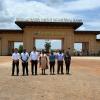MACRO Pillar: Boosting Investor Confidence through Policy and Business Environment Reforms.
The Macro Pillar focuses on building a stable and predictable economic environment that attracts and retains both domestic and foreign investment. This includes ensuring macroeconomic stability, strengthening the legal and regulatory framework, and improving the ease of doing business.
Uganda's fiscal, monetary, and trade policies are being aligned to promote a conducive environment for private investment, with specific attention to public financial management, public-private dialogue, and reduction of bureaucratic inefficiencies.
Efforts under this pillar target reforms in business licensing, taxation, and access to credit—key areas that influence investor perceptions. Improvements in the digitization of public services, such as the land registry and business registration systems, which reduce transaction times and costs for investors are prioritized. Notably, initiatives like the National Backbone Infrastructure (NBI) and the Uganda Electronic Single Window are pivotal in cutting red tape and boosting service efficiency.
Government is committed to implementing the recommendations of the Business Licensing Reform Committee (BLRC), which seeks to streamline Uganda’s regulatory regime. Attention is also placed on stabilizing inflation, reducing domestic borrowing, and tackling domestic arrears to build fiscal discipline—key macro signals investors consider before committing capital.
Ultimately, this pillar serves as the foundation of investor confidence—removing uncertainty, enhancing transparency, and creating a level playing field for all economic actors.
MACRO PILLAR: BOOSTING INVESTOR CONFIDENCE | ||||
Objective: Foster recovery and restoration of the private Sector to drive growth. | ||||
Outcome: Improved cost of doing business | ||||
# | Indicator | Baseline: 2019/20 | Update | |
Ease of Doing Business ranking | 116/190 | The Ease of Doing Business Index was discontinued after the 2020 report due to concerns about statistical inaccuracies and data manipulation. The World Bank has since introduced a replacement called Business Ready (B-READY). The 2024 B-ready report is the first of three during the rollout, it covers 50 economies (Uganda’s economy is not included in the first B-ready 2024 report). The second report, expected to be released in September 2025, will cover more than 100 economies. The third report, expected to be released in September 2026, will assess about 180 economies, bringing the rollout phase to conclusion
Source: B-READY 2024. | ||
Private Sector Credit as a % of GDP | 13.4% | 11.66% Source: MFPED POE May 2025 | ||
Manufactured exports (% of total exports) | 12.3 | 24.6% (2023/24 Source: Tenfold Growth paper 2024/25. | ||
Internet penetration | 25% | 72% Source: BUDGET SPEECH FINANCIAL YEAR 2025/26 | ||
Electricity consumption per capita(kwh) | 108.8 |
| ||
Cost of Electricity | Industrial (large) | 9.8 | 348.7 (Ush/kWh) Source: ERA tariffs APRIL TO JUNE OF THE YEAR 2025. | |
Industrial (Extra-large) | 8 | 203.6 (Ush/kWh) Source: ERA tariffs -APRIL TO JUNE OF THE YEAR 2025. | ||
% of the population with access to electricity. | 22.1% | 60% in FY 2024/25 from 57% in FY 2023/24. Source: BUDGET SPEECH FINANCIAL YEAR 2025/26 | ||


